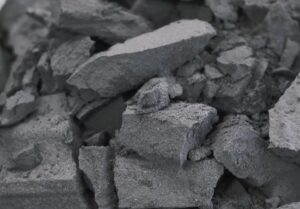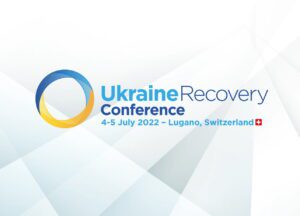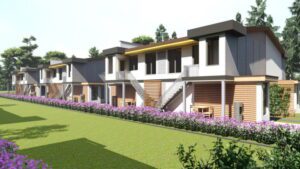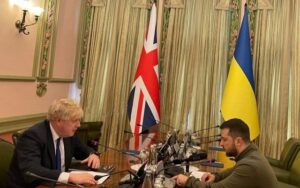
The Velta Group, which has assets for the extraction of titanium-bearing ores in Novomyrhorod (Kirovohrad region), has received its third patent from the US Patent and Trademark Office (USPTO) for its innovative Velta Ti Process technology.
According to a press release on Monday, the new patent confirms the possibility of obtaining high-quality titanium dioxide (TiO₂), a key material for the further production of titanium powder using the Velta Ti Process technology, as well as commercial products based on titanium, iron, calcium, and nitrogen.
It should be noted that Velta Holding US Inc. has obtained three Ukrainian and three US patents since 2020.
Velta Holding US Inc. is a group of companies engaged in the full cycle of titanium production, from the extraction of titanium raw materials through innovation to the manufacture of final metal products.
Velta LLC is a Ukrainian company that is part of the group and is a manufacturer of titanium raw materials and the only private Ukrainian company that has built a titanium mining complex from scratch in the Kirovohrad region. With over 15 years of experience in the mining sector, the company holds 2% of the global titanium market and has partners and customers in Europe and the US.
Velta Holding also includes the Velta RD Titan research and development center and Velta Medical, a manufacturer of custom titanium implants.
Velta Holding LLC is wholly owned by VKF Velta LLC. The ultimate beneficiaries are three individuals: Andriy Brodsky (60%), Vadym Moskalenko (20%), and Vitaliy Malakhov (20%).
PATENT, PROCESSING, TECHNOLOGY, TITANIUM, US, USA, VELTA

The work on the transfer of Israeli technologies related to smart alerts for missiles and drones to Ukraine is in progress, said the Ambassador of Ukraine to Israel Yevgeniy Korniychuk.
“Regarding the official things that we can comment – there is work on the transfer of Israeli technology related to smart alerts concerning missiles and drones. This technology is officially being transferred by the Israeli side. And I think that in a certain time we will receive it completely,” he said at a briefing at the Media Center Ukraine.
The Ambassador added that Ukraine still needs more active military-technical cooperation. However, according to him, there are many projects that cannot be commented on publicly yet.
“In order to have specifics on Iranian drones, I think it will take a few weeks. Since the government has just started work, it needs to make a decision taking into account the position of the U.S. as a major strategic partner, and the interests of the public,” the ambassador said.
He explained that the gap between the right-wing bloc that came to power and the left-wing forces is very small – 40 thousand voters, and the agenda is very much related to domestic politics, as well as the Palestinian question.
“So the issue of Ukraine is not a priority. Although we are trying with all our might to make it so,” Korniychuk added.
At the same time, the Israeli Foreign Ministry said that the issue of the war in Ukraine is a priority, said the Ukrainian diplomat.
“The minister said that he would facilitate more aid to Ukraine, without specifying it,” the ambassador said.

A large manufacturer of capping and packaging materials JSC Tekhnologiya (Sumy) in January-September received a net profit of UAH 214.18 million, which is 33.5% less than in the same period of 2021.
According to the company’s non-consolidated financial statements, published on Friday in the information disclosure system of the National Securities and Stock Market Commission (NSSMC), its net income fell by 5% to UAH 1 billion 457 million.
At the same time, the gross profit of Technologiya JSC increased by 22.6% – up to UAH 443.4 million, and UAH 297 million of profit was received from operating activities – 41% more.
According to reports, the company’s expenses under the item “other operating expenses” increased 3.6 times – up to UAH 136.79 million.
According to the company’s statements, in the first half of this year, it reduced its net profit by 6.7 times compared to the same period in 2021, to UAH 16.68 million, while net income decreased by 12.5%, to UAH 824 million.
Thus, in the third quarter of this year, Tekhnologiya’s net profit decreased by 6.5% to UAH 197.5 million, while net income increased by 7% to UAH 632.5 million.
Founded in 1990, Tekhnologiya produces capping and packaging materials, including decorative casings and caps for champagne decoration, label products, packaging for pharmaceuticals, combined material, and polyethylene film. The export geography included more than 60 countries.
The beneficiaries of the company are Vladimir Zayets (70%) and Pole Krzysztof Gzhondzel (30%).
Technologia Group’s global offices are located in the UK (TEO UK Packaging Limited), Poland (MUZEL LTD), Italy (TEO ITALY SRL).

On July 4, an international conference for the restoration of Ukraine started in Lugano, Switzerland. Among the main decisions taken on the first day of the conference, one can single out the approval of a plan to provide Ukraine with macro-financial assistance in the amount of $750 billion. Of this total, from 150 to 250 billion is expected to be directed to the restoration of infrastructure and housing damaged as a result of hostilities.
At the same time, the mechanisms for the practical implementation of this project remain unclear in the context of the ongoing war and the need to adapt legislation to it and establish partnerships between the state and private companies. Portal Open4business turned to Igor Stakovychenko, an expert in the field of construction and real estate, for a comment.
In his opinion, the practical implementation of the project should be started now at all levels, since delaying the process can lead to negative consequences in the autumn-winter period.
“Mechanisms for allocating funds from the confiscated assets of the Russian Federation and its large businesses are already being implemented by individual countries. We, in turn, need to implement the conversion of these financial assets into specific infrastructure and construction projects by creating representative offices in donor countries and coordination centers in Ukraine,” said Ihor Stakovychenko.
The expert also stressed that the regional principle of recovery, now promoted by the country’s leadership, when a separate partner state is engaged in projects in a separate Ukrainian region, is the most effective at this stage.
In addition, Igor Stakovychenko suggested creating a system of decentralized funding for the implementation of individual projects at the local level.
“But we must not forget about our responsibility to our partners. It is necessary not only to minimize, but to completely exclude the possibility of misuse of foreign aid by local officials. To do this, it is necessary to create a separate trust fund for each individual restoration project, the activities of which will be as transparent and controlled as possible by both the Ukrainian anti-corruption authorities and the donor country,” Ihor Stakovychenko emphasized.
According to the expert, the basis for the creation of such funds should be existing budget programs, as well as amendments to the main financial document.
“In fact, now we can receive funds both in the form of direct assistance and in the form of investments from partners. Here it is important to successfully implement and present the first major restoration projects, which will help increase investment attractiveness even in the current conditions,” added Igor Stakovychenko.
CONSTRUCTION, EXPERT, FINANCE, MARKETS, REAL ESTATE, RESTORATION_OF_UKRAINE, TECHNOLOGY, ІГОР_СТАКОВИЧЕНКО, СТАКОВИЧЕНКО

On July 1, the “Register of Destruction” is launched in Ukraine. With its help, homeowners whose houses and apartments were damaged as a result of hostilities and enemy shelling will be able to apply for compensation using the Diya application.
At the same time, the question of what the restored houses of Ukrainians will be like, taking into account the new realities and requirements for the housing stock after the war, remains no less important. The Open4business portal discussed these issues with Igor Stakovichenko, an expert in the field of construction and real estate.
“The introduction of the “Register of Destruction” will greatly simplify the procedure for compensating for damages for affected citizens. In fact, such a registry will bring together all the data on the destruction in the country. This will be very useful both for the state of Ukraine and for individual citizens when receiving compensation from the aggressor through international legal institutions,” the expert noted.
As for the new technologies that will be used in the construction of housing, here Stakovichenko recommends first of all to focus on the needs of society.
“What most people want from a new home, whose homes have been destroyed by the war, is reliability and security. The presence of equipped bomb shelters, convenient evacuation routes, autonomy – these are the criteria without which it is difficult to imagine post-war architecture,” Igor Stakovichenko stressed.
In his opinion, a good option would be the restoration and development of numerous recreational areas, some of which were abandoned even before the war. Stakovichenko believes that many Soviet-built sanatoriums and boarding houses, which have been practically not used for all the years of independence, can become a good platform for building eco-friendly settlements with autonomous service, since most of the communications have already been connected to them.
“Environmental friendliness and high technologies during construction will also become the hallmark of post-war architecture in Ukraine. Projects such as “zero energy houses”, or even “mini-power houses”, which are now being widely implemented in the EU, will also be popular after the war,” the expert added.
At the same time, Igor Stakovichenko sees no special prospects for aggressive development in the central areas of large cities, which was practiced before the war.
“Multi-apartment residential complexes in large cities will certainly continue to be built, but whether there is a buyer for such housing is already a question. I think many have already revised or will reconsider their views on comfortable housing as a result of the war,” the expert concluded.
CONSTRUCTION, EXPERT, FINANCY, IGOR STAKOVYCHENKO, MARKETS, REAL ESTATE, TECHNOLOGY, СТАКОВИЧЕНКО

The UK will supply Ukraine with technology and know-how to ensure that Ukraine is never blackmailed or threatened, Prime Minister Boris Johnson said after meeting with the Ukrainian president in Kyiv.
“We – the UK and other partners will supply equipment, technology, know-how, intelligence, so that Ukraine will never be subjected to the horrors of invasion, so that Ukraine will never be blackmailed or threatened in any way,” Johnson said at a briefing with the President of Ukraine in Kyiv on Saturday.